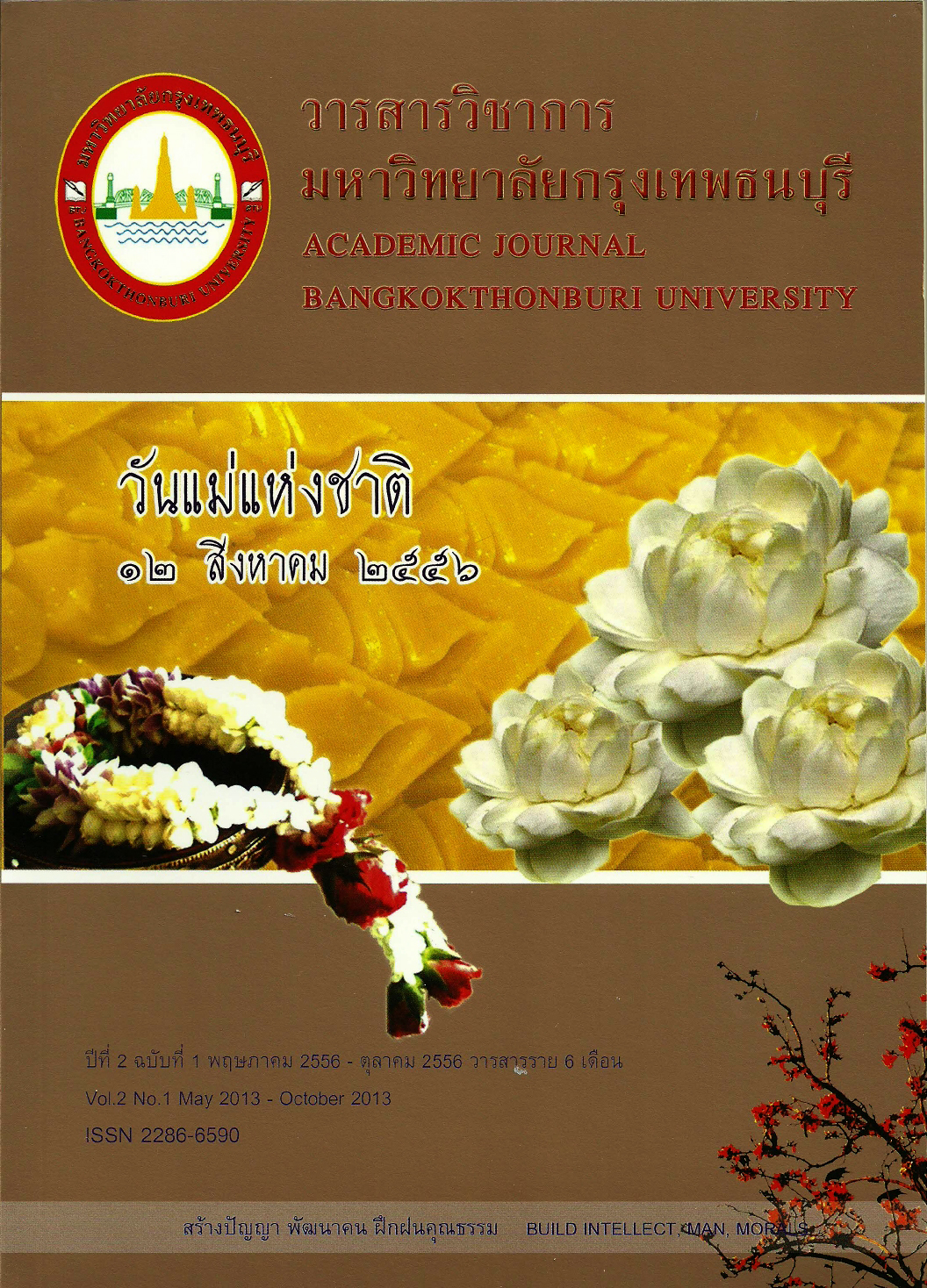แบบภาวะผู้นำที่พึงประสงค์ของอธิการบดีมหาวิทยาลัยไทย ในทศวรรษหน้า (พ.ศ.2556-2565)
Main Article Content
Abstract
การวิจัยครั้งนี้มีวัตถุประสงค์เพื่อศึกษาภาพอนาคตแบบภาวะผู้นำที่พึงประสงค์ของอธิการบดี มหาวิทยาลัยไทยในทศวรรษหน้า (พ.ศ.2556-2565) เป็นการวิจัยแบบผสมโดยใช้เทคนิคการวิจัยแบบ EDFR. (Ethnographic Delphi Future Research) ที่ผสมผสานระหว่างเทคนิคการวิจัยแบบ EFR (Ethnographic Future Research) และเดลฟาย (Delphi) ผู้เชี่ยวชาญที่ให้ข้อมูลในการสัมภาษณ์ เป็นการเลือกแบบเจาะจงจากผู้ทรงคุณวุฒิที่เป็นผู้กำหนดนโยบายการอุดมศึกษา นักวิชาการ ทางการอุดมศึกษา นายกสภามหาวิทยาลัยและอธิการบดี ทั้งในอดีตและปัจจุบัน ให้เป็นผู้มองภาพ ในอนาคตของการวิจัยครั้งนี้ ใน 3 สถานการณ์ คือ สถานการณ์ที่ดีเกินคาด สถานการณ์เลวร้ายและ สถานการณ์ที่น่าจะเป็นไปได้มากที่สุด การคำนวณหาคำตอบเกิดขึ้นเป็น 2 ระยะ คือ หาภาพจากการ มอง 3 สถานการณ์ของผู้เชี่ยวชาญแต่ละคนมาหาค่าร่วมของผู้เชี่ยวชาญ 15 คน และใช้เทคนิคเดลฟาย เพื่อหาฉันทามติ โดยได้คำตอบใน 3 ด้าน คือ คุณลักษณะ แนวคิด และทักษะ
ผลการวิจัยได้ภาพอนาคตแบบภาวะผู้นำที่พึงประสงคข์ องอธิการบดีไทยในทศวรรษหน้า เป็น 2 ส่วน ส่วนแรก คือ การมองภาพอนาคตโดยทั่วไป พบว่า คุณลักษณะของอธิการบดีไทยไม่มีการเจาะจงเพศ ควรมีสุขภาพร่างกายและจิตใจที่สมบูรณ์ มีสติ มีความขยันทำงานหนัก เข้าถึงคนสถานการณ์และงาน ได้ดี เปิดใจรับฟังผู้อื่นและมีเป้าหมายในการพัฒนาศักยภาพของคนไทย อธิการบดีควรมีแนวคิดด้าน ความรับผิดรับชอบ ความซื่อสัตย์มีหลักการ ความมีวิสัยทัศน์ สร้างผู้นำในอนาคตและมีความโปร่งใส อธิการบดีควรมีทักษะในการตัดสินใจ สามารถในการสื่อสาร รู้จักพัฒนาตนเอง รู้จักบริหารคน ในส่วน ที่ 2 พบว่า แบบภาวะผู้นำที่พึงประสงค์ของอธิการบดีไทยในทศวรรษหน้า (พ.ศ.2556-2565) มีการ ผสมผสานของแบบภาวะผู้นำพื้นฐานกับวิถีคิดแบบไทยบนพื้นฐานวัฒนธรรมไทยทำให้เกิดเป็นแบบ ภาวะผู้นำไทยสมดุล ได้แก่ การลดอัตตา มีความละอายและความเกรงกลัวต่อบาป ประพฤติตนอยู่ใน ศีล 5 มี พรหมวิหาร 4 ตามองดาวเท้าติดดิน คือ รู้จัก การแข่งขันบนพื้นฐานของความเป็นจริง เข้าใจ และสามารถนำหลักปรัชญาเศรษฐกิจพอเพียงไปประยุกต์ใช้ในความเป็นจริงได้
นอกจากนั้นยังมีประเด็นที่น่าสนใจ คือ การที่อธิการบดีมหาวิทยาลัยไทยจะต้องมองการณ์ไกล สู่ระดับนานาชาติโดยควรรู้จักการแก้ปัญหา ต่อต้านการคอรัปชั่น ส่งเสริมการเรียนรู้ตลอดชีวิตและ นวัตกรรม ประพฤติตนเป็นแบบอย่างที่ดี มีจิตสาธารณะ เป็นผู้นำสังคม มีความสามารถในการใช้ภาษา อังกฤษในการสื่อสาร รู้จักการใช้วัฒนธรรมองค์การให้เป็นประโยชน์ รู้จักการจัดลำดับความสำคัญและ มีวิธีการคิดแบบหลายมุมมอง ถึงแม้อธิการบดีของมหาวิทยาลัยของรัฐ มหาวิทยาลัยในกำกับของรัฐ และมหาวิทยาลัยเอกชน จะมีนโยบายและพันธกิจที่แตกต่างกัน แต่สิ่งที่อธิการบดีมหาวิทยาลัยทุก แห่งควรมีร่วมกันในอนาคต คือ การเป็นผู้นำในการลดความเหลื่อมลํ้าทางเศรษฐกิจและสังคมและ ความเห็นแก่ตัวที่เกิดขึ้นแล้วในสังคมไทยและเป็นผู้นำในการเพิ่มศักยภาพของคนไทยด้านการแข่งขัน และการสร้างนวัตกรรมในอนาคต
การวิจัยครั้งนี้อาจเป็นประโยชน์ในการคัดสรรและการฝึกอบรมอธิการบดี ข้อเสนอแนะในการวิจัยครั้งต่อไป ควรศึกษาแบบภาวะผู้นำที่พึงประสงค์ของอธิการบดีมหาวิทยาลัยไทยในทศวรรษหน้า โดยการศึกษาข้อมูลจากผู้มีส่วนได้ส่วนเสีย เช่น นักศึกษา และภาคตลาดแรงงาน หรือวิจัยเฉพาะ ในส่วนที่เกี่ยวกับคุณธรรมจริยธรรมของอธิการบดีไทยในทศวรรษหน้า
Desirable Leadership Styles of Thailand’s University Rectors In the Next Decade (2013-2022)
The objective of this research is to study future desirable leadership styles of Thailand’s university rectors in the next decade (2013-2022). It is a Mixed-Methods type of research, using the Ethnographic Delphi Future Research (EDFR) technique which is a combination of the Ethnographic Future Research (EFR) and Delphi (D) techniques. Data were obtained from questionnaires and interviews with 15 experts who were purposively selected from highly qualified persons responsible for prescribing higher education policies, academics in the field of higher education, chairpersons of university councils and university rectors-both past and present. They were asked to provide views on key aspects studied in this research, based on three scenarios: Optimistic Scenario, Pessimistic Scenario and Most Probable Scenario. Calculation of results were done in two phases: to find viewpoints of each expert regarding the three scenarios, and calculate the combined results of the 15 samples, and using the Delphi technique to arrive the consensus, by obtaining the results in 3 dimensions: characteristics, philosophy assumptions and skills. Results of the research show future desirable leadership styles of Thailand’s university rectors in the next decade in two parts. The first part is a general view indicating that in terms of characteristics, there is no sex specific, they should have perfect physical and mental health, being mindful, diligent, ready to work hard, have a good understanding of people, situations, and tasks, be receptive to opinions of others, and aim at developing potentials of the Thai people. In terms of philosophy assumptions, rectors should have accountability and integrity, be principled and have visionary in grooming future leaders, and also be transparent. Skills that leaders should have include the following: decision-making, communication, self-development and people management. In the second part, research results show that future leadership styles of Thailand’s university rectors in the next decade should be a mixture of fundamental leadership styles and Thai ways of thinking based on Thai culture which would lead to a Thai well-balanced leadership style, that is, less egocentric; being ashamed of committing sins and having moral dread; observing the five precepts of Buddhism; practicing the four Bhramavihara (sublime states of mind); aiming for the stars with feet firmly on the ground, that is, being competitive while recognizing realities; understand the philosophy of sufficiency economy and able to apply it for use. In addition, others issues of interest include the necessity for Thailand’s university rectors to be forward-looking at the global level by knowing how to solve problems; oppose to corruption; promote life-long learning and innovation; conduct themselves to serve as good role model; possess a public conscience; be a leader of society; able to use English language in communication; know how to use organizational culture beneficially, can prioritize; and have multi-dimension viewpoints. Although rectors of state universities, state-controlled universities, and private universities have different policies and missions but what they should have in common in the future is to be leaders in narrowing the economic and social inequalities and selfishness that exist in Thai society and be leaders in enhancing potentials of Thai people to compete and build up innovation in the future. This research can be useful in the selection and training of rectors. Suggestions for future research is to study desirable leadership styles of Thailand’s university rectors in the next decade based on data from other stakeholders such as university students and the labour market sectors, or focusing specifically on the issues of morals and ethics of rectors in the next decade.


